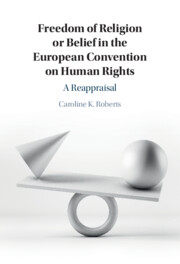Book contents
- Freedom of Religion or Belief in The European Convention on Human Rights
- Freedom of Religion or Belief in the European Convention on Human Rights
- Copyright page
- Dedication
- Contents
- Preface
- Acknowledgements
- Table of Cases, Applications and Communications
- Table of Treaties, Declarations and Other International Instruments
- Abbreviations
- Introduction
- Part I The Understanding of the Right to Freedom of Thought, Conscience and Religion in Echr Article 9
- Part II The ECtHR’s application of its general principles concerning the right to freedom of thought, conscience and religion in echr article 9
- 4 A High Degree of Forum Internum Protection under ECHR Article 9
- 5 A Low Degree of Forum Internum Protection under ECHR Article 9
- 6 A Range of Forum Internum Protection under ECHR Article 9
- 7 A Range of Forum Internum Protection under ECHR Article 9
- Part III reappraising the understanding of the right to freedom of thought, conscience and religion in echr article 9
- Bibliography
- Index
4 - A High Degree of Forum Internum Protection under ECHR Article 9
from Part II - The ECtHR’s application of its general principles concerning the right to freedom of thought, conscience and religion in echr article 9
Published online by Cambridge University Press: 02 December 2023
- Freedom of Religion or Belief in The European Convention on Human Rights
- Freedom of Religion or Belief in the European Convention on Human Rights
- Copyright page
- Dedication
- Contents
- Preface
- Acknowledgements
- Table of Cases, Applications and Communications
- Table of Treaties, Declarations and Other International Instruments
- Abbreviations
- Introduction
- Part I The Understanding of the Right to Freedom of Thought, Conscience and Religion in Echr Article 9
- Part II The ECtHR’s application of its general principles concerning the right to freedom of thought, conscience and religion in echr article 9
- 4 A High Degree of Forum Internum Protection under ECHR Article 9
- 5 A Low Degree of Forum Internum Protection under ECHR Article 9
- 6 A Range of Forum Internum Protection under ECHR Article 9
- 7 A Range of Forum Internum Protection under ECHR Article 9
- Part III reappraising the understanding of the right to freedom of thought, conscience and religion in echr article 9
- Bibliography
- Index
Summary
The chapters in Part II—which analyse the way in which the ECtHR applies its general principles relating to Article 9—follow the loose concentric circles model. Chapter 4 focuses on cases concerning deprogramming, coercive psychiatric treatment, indoctrination, and sanctions on employment due to religion or belief affiliation. These are the kinds of cases one would expect to fall into the innermost circle in the loose concentric circles model, where there is strongest forum internum relevance and weakest countervailing factors and, thus, a high degree of forum internum protection. Through the case law analysis, this chapter aims to demonstrate that the ECtHR’s approach is consistent with its general principles relating to Article 9. Even in these kinds of cases, the ECtHR does not offer absolutely absolute protection to the forum internum, rather, the ECtHR balances factors indicating a violation (primarily, but not only forum internum relevance) with countervailing factors in order to reach its decision. This chapter explains that the ECtHR only offers a very high degree of protection where it considers forum internum relevance to be strong and countervailing factors to be weak.
Keywords
- Type
- Chapter
- Information
- Freedom of Religion or Belief in the European Convention on Human RightsA Reappraisal, pp. 91 - 119Publisher: Cambridge University PressPrint publication year: 2023



